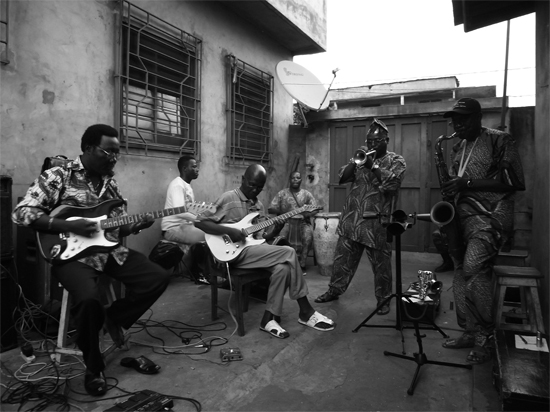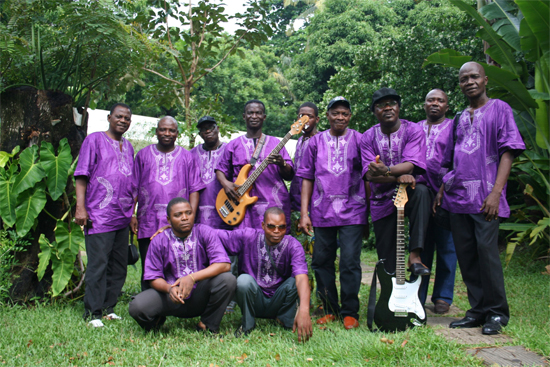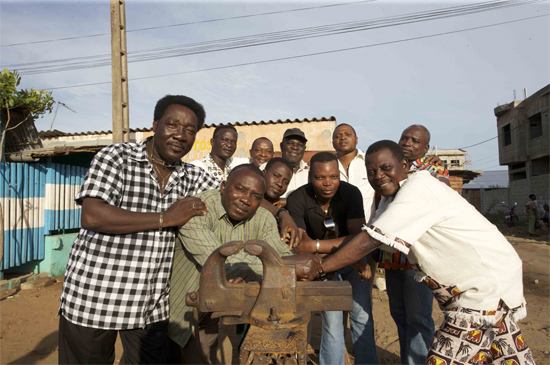It’s almost a miracle that, tomorrow night, Orchestre Poly-Rythmo de Cotonou will play the London Scala, and that just weeks ago they released their first album proper in decades, Cotonou Club. And, as we’ll discover in an interview with founder member and vocalist Vincent Ahehehinnou, there’s no doubt great debate within the ranks of Orchestre Poly-Rythmo De Cotonou as to who is to thank for their remarkable return and ever-increasing success in the west.
Founded way back in 1966, the Orchestre’s heyday saw them release over 50 albums that partnered thousands of performances in the clubs and bars of Benin, where they occasionally shared a stage with Fela Kuti. A Marxist-Leninist government and the deaths of two key members in the early 80s spelled the end. But such a remarkable and prolific group was unlikely to remain undiscovered for too long, and soon their work came to the attention of the Analog Africa label, who released a series of compilations (and this month reissue their 1973 debut LP).
Then, Elodie Maillot, a French journalist and radio presenter (and now band manager and producer) went to Benin to find out what had happened to the group. As it happens, she’s translator for the Quietus’ interview with Vincent Ahehehinnou, and takes up the story: "I had all the vinyl, and I wondered if they were still alive. I went over to find them, and it was a difficult time because the President had shut down all the mobile phones. They asked me if I could make one dream they had come true. They were having a hard time, with no money and instruments, only playing for weddings or Independence Day. It’s very rare to see Orchestres playing in Cotonou nowadays because most of the clubs are closed and it’s expensive to pay so many musicians. They said ‘We see you really love the Orchestre.’
"I helped them to tour, but I said you have no record to prove that you are still good, the reissues yes, but there is nothing from now. I found people happy to produce it, but it was a big risk. I wanted to fulfil the promises I had made to them, but in today’s world to prove you still can play and are still good you need a record. Then the equivalent of the Barbican in Paris wanted to book them for a festival. There was a gap between shows and we made the record. I never thought in my life I would produce a record!"
That record is Cotonou Club, the title a tribute to the clubs that closed and orchestres who can no longer play. Released last month via Strut, it is an album that proves that the surviving members of the Orchestre have lost none of their ability to create mesmerising smooth and intricate West African funk.
Did the Orchestra think they would ever, or even want to come to the UK?
Vincent Ahehehinnou: I never thought we’d come here, we never even considered it. When we started making music we didn’t want to travel, we just wanted to make music. If we had wanted to do that we would have adapted our music to be saleable to export, but we didn’t want to do that, we never wanted to do something to please a European audience.

Going back to the early days, I wanted to ask about the influence of the voodoo tradition…
VA: We were born in the voodoo music, and our children are born in the voodoo music, you can’t be divided from it. The constitution of Benin has voodoo. When the President of Benin is elected, he has to be faithful to the ancestors. In 1996, when we elected the President the second time, he was very Christianised, and he didn’t swear on the voodoo part of the constitution, he didn’t want to be involved in voodoo any more. But he had to come back to swear properly on the voodoo constitution. You have been to Africa? You hear of Africa in the news? Benin is one of the places where there hasn’t been a civil war. There has been no blood. And that is because of voodoo, it brings justice and peace.
In the days when you had a Marxist-Leninist government, were you able to perform your music, or was it suppressed?
VA: In ’75 the country was officially Marxist. At that time if a club or a bar did not turn the radio on at 8 and 11 o’clock for the official news so the whole place could hear it, then the bar or the club would be closed. TV came in 1978, so at that time the President would insist on talking for two hours, and the music people were sick and tired of listening to him, so they wanted to change the station. They wanted to listen to James Brown rather than the radio, and so they were closed down. There was also a curfew at 11 o’clock, and Saturday at 3 o’clock. We were never arrested, but they would arrest the audience. Everything closed down in Cotonou, and Cotonou started to sleep at night. The only way to not get your bar closed was if you knew somebody and could bribe them.
It was impossible for them to affect the voodoo, though. In Benin there are a lot of different Christian churches, and the regime tried to suppress them, the protestant churches, and the mosques. But they never tried to touch the voodoo places, the equivalents of shrines. Christianity has come through colonialism too, but our faith is stronger because it was in the country before. Even though I am not a voodoo priest, if I wanted for bees to come and invade a church so there would be so many bees in the church that people couldn’t come inside, I could do it.
Is voodoo important for all the group?
VA: No, the bandleader is an evangelical Christian. There are many different views, and we never agree. The chief was high in the voodoo faith, but he turned to evangelism. We said OK, but you cannot force us to follow you. The difference between the God of the church and the voodoo is that the voodoo moves more efficiently and quickly, you do not have to wait to pray.
How do these divisions affect the group?
VA: Everyone has his own inspiration, we bring our own ideas and we practice together. When we were young, we composed more selfishly, there was more ego.
When did you personally start listening to and making music, and then join the group?
VA: I listened to music from America, from England, and from Africa too. I used to listen to my father’s radio, and there was a show for young people. It was very difficult to afford to buy a radio, but today I can buy records and I listen to a lot of jazz, which is a great source of inspiration for me.
I think you can hear more jazz influence on the new record.
VA: It has always inspired our composition, mixed with voodoo. All the voodoo traditional instruments we use we have just modernised with everything you would find in jazz.
There’s that connection with New Orleans jazz too.
VA: So many of our ancestors couldn’t express their suffering, so to express their sorrow they had to use music and songs. I really want to go to New Orleans – I dream of New Orleans. I went to New York, and visited Harlem, to see the theatre where Apollo Theatre where James Brown performed. I had dreamed that once in my life I would see that, to see where black people had been able to make something from their suffering.

Can you tell us a little about playing with Fela Kuti?
VA: He was a living legend. There is something very spiritual in his music, there is something higher than music. He had his musical success, and his political success, and he was an African! In Nigeria, there were the political men and the rich men, and he made fun of them, all his songs were politically motivated. It was a time when it was hard for us to speak politically, so he has to be a model for African musicians. We did about Afrobeat tracks and covers. When he knew we were recording in Lagos he came to the studio, and gave comments. When he came to Cotonou we played with him, and he was the first African artist I saw smoking the cannabis sativa. He was a great man, and a great man for African music.
How did you use to release music in Benin? There were so many albums you put out.
VA: We used to have bars where we’d play, and clubs. And people would come to Cotonou to pick up our records. People loved Johnny Hallyday and Orchestre Poly-Rythmo, and they’d buy them without listening because they knew they were good. If people heard a good song in a club they would think it was Orchestre Poly-Rythmo even if it wasn’t.
Yeye We Nou Mi – Orchestre Poly-Rythmo de Cotonou by Analog AfricaNow people are able to operate more freely in Benin. How have the Orchestre been affected?
VA: Now people would rather take a record and play it in a bar than book the Orchestre to come and play. We try to speak to the government to get the land and the authorisation to build our own bar, but you still have to know the right people, there is a lot of bureaucracy and it’s hard to be an entrepreneur.
There’s a track on the album recorded with Franz Ferdinand. How did that work for you?
VA: They really proved that they are great musicians. We came with the rhythm, and he [Paul Thomson] is a very good drummer. We’ve listened to their records, and we’ve played some of their songs together. We played ‘Take Me Out’.
Members have left the Orchestre, and others have died, but what is the core spirit of the group?
VA: It is the team spirit. We argue sometimes, and really shout, but we cannot hate each other. The bandleader is neutral, he never takes one side or the other. We have had bad times together, but we stick together, we are getting along. We would really love the people we lost to be with us and sharing the great joys we now have. It is too bad that they’re not here.
Cotonou Club is out now. The Orchestre play the London Scala tomorrow night, May 5th



